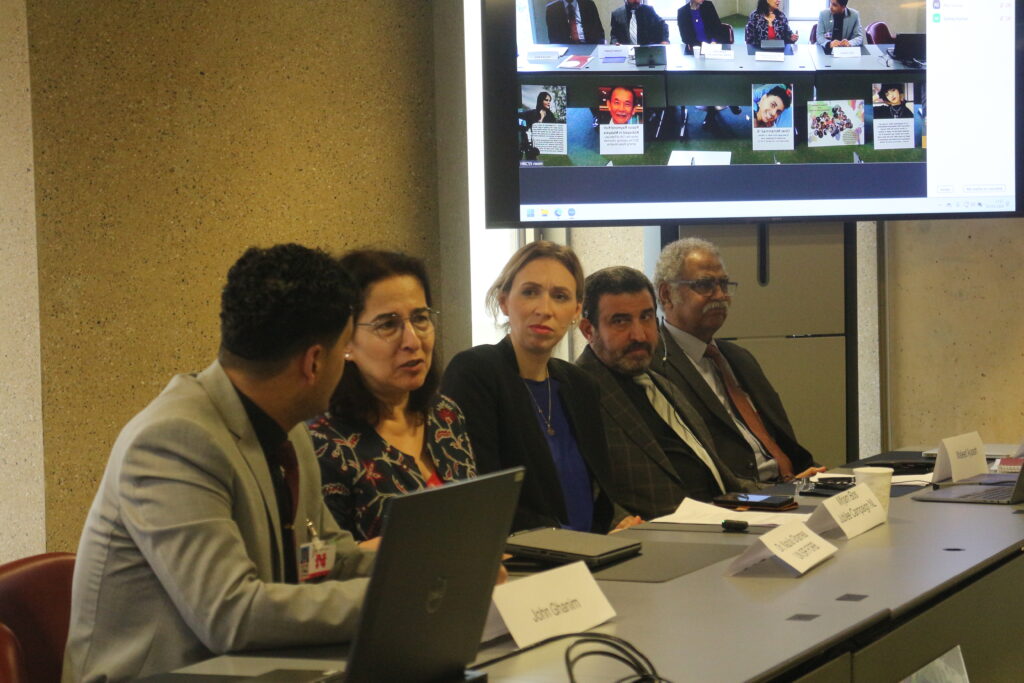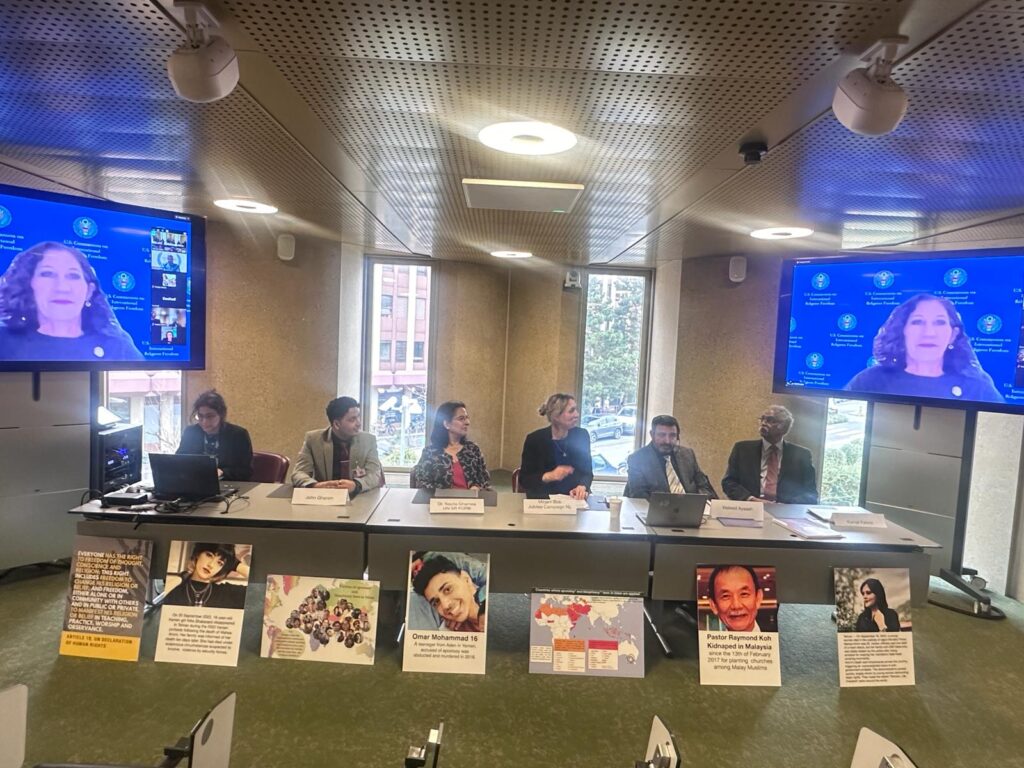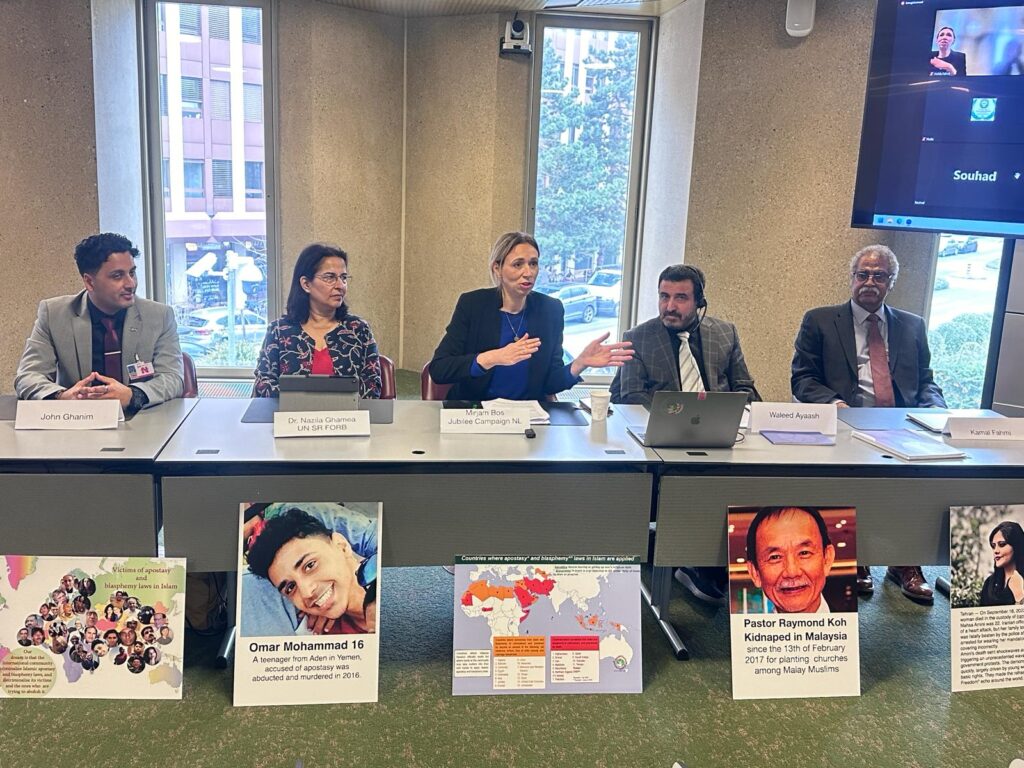WASHINGTON, D.C., 22 March 2024 – “When the elephants fight it is the grass that suffers,” the African proverb says. The Yemeni people are all too familiar with this proverb, especially the religious minorities. On the second floor of the CICG in Geneva, Switzerland, experts, and diverse survivors from the religious minority communities in Yemen shared their experiences and actions to emphasize the importance of ensuring freedom of thought, conscience, religion and belief is a lived reality in Yemen.
“One of the [gravest] laws violating freedom of thought and conscience, is the anti-apostasy and anti-blasphemy laws in Islam in Yemen. They have death sentence for these two laws and we would like this to be abolished,” Kamal Fahmi with Set My People Free shares. He was approached by Christian Pastor Musheer Al Khulaidi two years ago to jointly start a working group on religious freedom in Yemen, from this group, the idea to host this parallel event in the lead up to the Universal Periodic Review of Yemen was birthed.
“In Yemen, not only are people suffering for humanitarian and reasons of conflict, but there are many populations, and I was interested to hear the figure of 25%, […]are suffering an additional burden […] because of their religion or belief […] These rights violations against religious minorities are prevalent. Dozens have been subjected to disappearance, arbitrary detention, ill-treatment and prosecution on grounds of their religion or belief,” Dr. Nazila Ghanea, the UN Special Rapporteur on freedom of religion or belief, raises how religious minorities experience an additional burden, being marginalised in an already dire situation. She gives recent examples of the Houthi militias’ short-term enforced disappearance and arbitrary detention of 17 Bahais, of which five still remain imprisoned.
The Special Rapporteur presents her report during the 55th UN Human Righs Council session on the theme: Transformative Response to Stem Adovacy of Hatred Based on Religion or Belief. She explains how the report urges states to increase their support for local civil society organizations that advocate on behalf of seeking to address and ensure the rights of minorities all around the world, “It’s important to document violations and build local capacity. And I commend your work in seeking exactly to ensure this.” She sees the National Council of Minorities in Yemen as a “welcome opportunity to seek to ensure understanding and a better future for Yemen.”
USCIRF Commissioner Susie Gelman shares via video message the importance of religion and belief in the context of Yemen: “With so much global attention on the Houthis in the wake of the October 7th Hamas attack on Israel, the international community must work together to find new and creative ways to stem the violence and horrific violations the group is perpetrating against religious minorities in Yemen.” She brings attention to several religious prisoners of conscience still being held by the Houthis including Jewish Libbi Marhabi and the five representatives of the Bahai community. She also notes the suffering experienced by Christians in Yemen both in Houthi-controlled areas in the areas under control by the UN-recognised government: “Christians in Houthi controlled Yemen likewise cannot worship safely in public and fear public exposure of their religious identity. The same is true for Christians living in areas controlled by the UN-recognized government, where Yemeni law prohibits conversion from Islam to any other religion, including Christianity.” She emphasises the importance of interfaith dialogue, education and counter speech to “remediate the intolerance spread from the Houthis’ continued targeting of religious minorities,” and the importance of “elevating the principles outlined in the UN Human Rights Council’s Resolution 1618 for combating intolerance and discrimination based on religion or belief.”
“Being vocal about one’s faith is considered a crime and is punishable by imprisonment. Christian minority members face incitement by the Houthi group and they are constantly labeled as one of the foreign agents or tools by foreign powers against Yemen,” Pastor Musheer Al Khulaidi shares. Houthis detained him for four years for exercising his religion.
In addition, religious minority women face double vulnerabilities, including through the male guardian laws. Huda Al Obeid, raises these concerns together with the experts. Huda is herself a woman religious minority survivor of arbitrary detention by the Houthis. She is working for a different lived experience for religious minority women for the future. She emphasises in her introduction the pivotal role women play in society, “women are the first educators of the generations, and they are partners in various fields of economic, social and cultural life. Their participation increases productivity and contributes to progress and prosperity and the promotion of peace and harmony, wherever they enjoy their full rights.” However, in Yemen unfortunately this is not yet a lived reality, “the rights of religious minorities in Yemen remain restricted and subject to derogation and violation.” She shares about the compounded hate campaigns directed towards women, including the spreading of false rumors and fabricated slanders against them, “questioning their morals and loyalty […] the extent that the reality of minorities in Yemen has become a terrible tragedy which has compounded the suffering of Christian women.” She shares, “Women suffer from the deprivation of the most basic rights this has caused women of the Christian minority and other minorities to endure double the suffering from exclusion, imprisonment and torture within Yemen.”
Even in displacement religious minority women are excluded from receiving aid, Huda shares how this impacts them: “since there are many women-headed refugee families, the mother who suffers from the difficulties of solitary life is also subjected to humiliation, blackmail and threats in the absence of rule of law and the lack of support and protection.” Huda Al Obeid makes a concrete appeal for the inclusion of women in all fora, “the National Council of Minorities in Yemen firmly believe that putting an end to the oppression of women and achieving full gender equality is one of the most important prerequisites for peace that should prevail in our beloved country”. She provides several steps to make this a reality including through women’s participation, alongside men, “in all public affairs, including peace negotiations, planning for the future, changing laws and participating in the government with its own merits.” She also raises the importance of enabling women to “reach high levels of education and equal opportunities, that they are often denied.” She concludes, “Women can make unique contributions to the creation of a fair and co-operative system as well as harmony, empathy and humanity that Yemen never enjoyed before in its contemporary times.”
Waleed Ayaash, who is the Secretary General of the Council of Minorities and a follower of the Bahai faith shares how the National Council of Minorities started after he was released from prison with a group of Christians, Jews and Bahais, “from our shared suffering we thought that we need to have an entity that expresses our aspirations to dignified living and freedom of religion and that this entity will help us leverage our rights.” He urges states to work for the official recognition of the National Council of Minorities in Yemen and work for the release religious prisoners of conscience.
One of his main concerns is the incitement against minorities in Yemen, “Imprisonment and persecution against the minorities in Yemen by the Houthi Group is practiced with complete impunity, this hatred needs effective counter accountability.” He also urges for the elimination of all forms of religious discrimination and intolerance and on the local level urging the nationally recognized Yemeni government to, “ratify the Rome Statute” and also in the next phase work for constitutional amendments to “guarantee freedom of thought and belief and equal citizenship, which recognizes coexistence of the rights of religious and ethnic minorities, and that everybody will be free to choose his own religion.”
He mentions how violations against minorities are “based on legislations and religious provisions that criminalize conversion from Islam to another religion and prohibits changing one’s religion and considers it a serious crime.” He mentions how it affects his community: “The Bahais of Yemen have suffered […] being subjected to mass persecution and systematic incitement as well as looting of their assets and property and silent genocide against them, in addition to imprisonment and torture against anyone who professes his conversion to the Baha’i faith [by the Houthis].” Waleed Ayaash also urges for the release of the remaining five Bahais detained by the Houthis and 20 Ahmadis.
John Ghanim was born and raised in Yemen but gave up Islam when he was in Mecca 2004, and later three years later, he left Yemen and gave his life to Jesus Christ when he was in Greece as a refugee. He shares how he started his involvement on sharing his faith online, “I wanted to find Yemeni Christians, but I couldn’t find online. So I had that burden and desire to share my faith publicly. So I started to share my faith publicly, and I started to receive persecution from the first day and my family disowned me.” He shares how the imam in his village forcibly divorced him from his wife and took away his daughters and due to the pressure his mother had to disown him. He emphasises the importance of being recognised as a Yemeni, “I want everyone to understand that I am not a threat. I am a human being, I exist. And I want to tell you today we are Christian, we exist. We are Yemeni Christian, we exist.”
The panelists make clear that religious minorities are part of the fabric of the country. Moderator Mirjam Bos, with Jubilee Campaign concludes the event noting the courage of the survivors, “I would really like to thank the Council for your work and your courage[..] speaking clearly and openly about what is happening to you as a convert or as a person from a different religion.” The work continues, states cannot restrict freedom of conscience and as flagged in a letter to the delegations at the United Nations in 2016: “Apostasy laws cannot change human nature; people will always be compelled to seek the truth about questions of ultimacy. But apostasy laws bring immense suffering by persecuting men and women – simply for exercising their freedom of conscience, that is, for being human.”- Kamal Fahmi, Set My People Free and Aaron Rhodes, Forum for Religious Freedom-Europe.
Resources:
Read Jubilee Campaign’s joint Universal Periodic Review on Yemen: https://jubileecampaign.org/yemen-upr-2024/
Join the Campaign to Repeal the Death Penalty for Apostasy and Blasphemy: https://jubileecampaign.org/7603-2/irf-summit-2024/
Jubilee Campaign is a non-profit organization which promotes the human rights and religious liberty of ethnic and faith minorities in the most oppressive countries. We assist individuals seeking asylum from religious persecution as well as promote the care and well-being of larger groups of refugees fleeing persecution.



